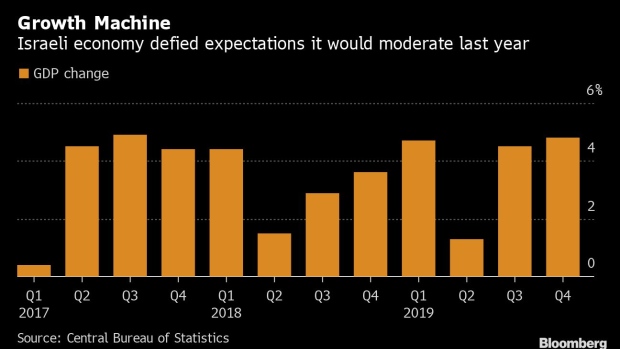Feb 18, 2020
Netanyahu Seeks Votes at Supermarkets After Trump Embrace Flops
, Bloomberg News

(Bloomberg) -- When Donald Trump and Vladimir Putin don’t do the trick, try the supermarket checkout.
Having failed to boost his electoral support with diplomatic victories at the White House and Kremlin, Israel’s indicted Prime Minister Benjamin Netanyahu has pivoted to pocketbook issues in his bid to finally vanquish his main rival as yet another election looms.
A new campaign video has the premier decrying high food costs while ringing up purchases at a cash register. “The price of food in Israel is too expensive,” Netanyahu tells supporters while tearing up the receipt, ignoring the fact that he’s been steering the country’s economy for the past decade. “Our first mission is to take this and cut it in half.”
Israelis head to the polls on March 2 for the third election in less than a year after earlier rounds of balloting ended in deadlock. Until now, Netanyahu has tried to motivate supporters by touting his diplomatic achievements and emphasizing his commitment to Israel’s security. He was hoping for a bump from the release of President Donald Trump’s Middle East peace plan, which heavily favors the interests of Israel’s right-wing parties.
But that blueprint and the Kremlin’s release of a jailed Israeli backpacker just days later failed to budge Netanyahu’s standing in polls. He currently trails centrist former military chief Benny Gantz, while his bloc of right-wing and religious parties remains short of the 61 seats it needs to form a government.
So he’s switched gears to something that hits voters a little closer to home: Their bank accounts.
On Sunday, his Likud party released an economic plan that promises to lower the cost of living while boosting small businesses and communities on the country’s periphery. Many of these promises are recycled from previous campaign playbooks: cutting regulation, breaking up monopolies, lowering steep housing prices. No new taxes, though, despite the central bank’s assessment that it will take a mix of tax hikes and spending cuts to curb Israel’s widening budget deficit.
“The choice in two weeks is between a free and successful economy, and a Histadrut economy,” Netanyahu’s finance minister-designate, former Jerusalem mayor Nir Barkat, said Sunday in a jab at Gantz’s economic adviser Avi Nissenkorn, a Blue and White lawmaker who used to be chairman of the Histadrut labor federation.
The economic pivot also takes the focus off Netanyahu’s upcoming trial on charges of bribery and fraud.
“He’s got nothing to lose by it because there has been some good news on the economic front,” said Reuven Hazan, a Hebrew University political scientist. “This is one of the few areas where Netanyahu can say he’s succeeded.”
Under Netanyahu, Israel has posted strong economic growth while reducing its public debt load, though figures have sometimes been boosted by one-off factors. Unemployment is around record lows, and wages have risen. Yet income inequality ranks among the highest in developed nations, and problems like the high cost of living and outdated infrastructure remain unsolved. Commercial hub Tel Aviv is one of the most expensive cities on the globe, while Israel’s traffic is the worst in the developed world.
Netanyahu Rival Eyes Gas Fund to Improve OECD’s Worst Traffic
Gantz’s Blue and White bloc is seizing on these problems to cut into Netanyahu’s record. It’s highlighted the country’s overburdened health-care system and troubled schools as reasons for a change in leadership, while similarly planning to cut living costs without raising taxes.
Gantz’s post-military foray into the business world fumbled as the analytics start-up he chaired collapsed after raising tens of millions of dollars. Blue and White says it will have an experienced team focusing on the economy, and that the problems Netanyahu identifies have persisted under his decade in power.
“When you speak about free markets, fine. When you speak about providing remedy to significant challenges, where have you been for the last 10+ years,” asked Izhar Shay, a venture capitalist turned parliament member for Blue and White.
To contact the reporter on this story: Ivan Levingston in Tel Aviv at ilevingston@bloomberg.net
To contact the editors responsible for this story: Lin Noueihed at lnoueihed@bloomberg.net, Amy Teibel, Mark Williams
©2020 Bloomberg L.P.